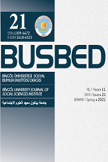JUSTICE: THE DIALECTIC UNITY OF COMEDY AND TRAGEDY
JUSTICE: THE DIALECTIC UNITY OF COMEDY AND TRAGEDY
Author(s): Funda GünsoySubject(s): Studies of Literature, Sociology of Law
Published by: Bingöl Üniversitesi Sosyal Bilimler Enstitüsü
Keywords: tragedy; comedy; Aeschylus; modern law; legislation; Moira;
Summary/Abstract: Modern culture is organized by the idea of rationalization which extinguishes the feeling of the tragic life that represent not only tragedy as a literary genre or an aesthetical category, but also the insolubility of conflict between the good ones, the contradiction and conflict in regard to the essence of life, the unexplainable arbitrariness of factual circumstances, devastating potential of passions. This very fact shows that tragedy cannot be seen solely as a means of entertainment or a literary genre. If tragedy as an aesthetical category is the artistic expression of tragic experience, it can only be understood in a cultural context that underlies experience. Tragedies are the ethos of human existence. Indeed, ancient tragic dramas are based on the metaphysical suppostion that conflict, contradiction, arbitrariness and uncertainity is implict to both the structue of human beings and to the whole universe. In this context, this article aims to offer a reflection on the foundations of law by considering the oxymoronic character of thinking law together with tragedy. From the perspective of this paper, such a reflection not only challenges our definition of tragedy as an artistic imitation of a certain aspect of human life and law as the specific social technique of forced order that excludes tragic situations; it may also show that tragedy has the potential to expose a tragic aporia that underlies modern law but is hidden behind cold legal texts and complex institutional arrangements.
Journal: Bingöl Üniversitesi Sosyal Bilimler Enstitüsü Dergisi (BUSBED)
- Issue Year: 11/2021
- Issue No: 21
- Page Range: 11-19
- Page Count: 9
- Language: English

